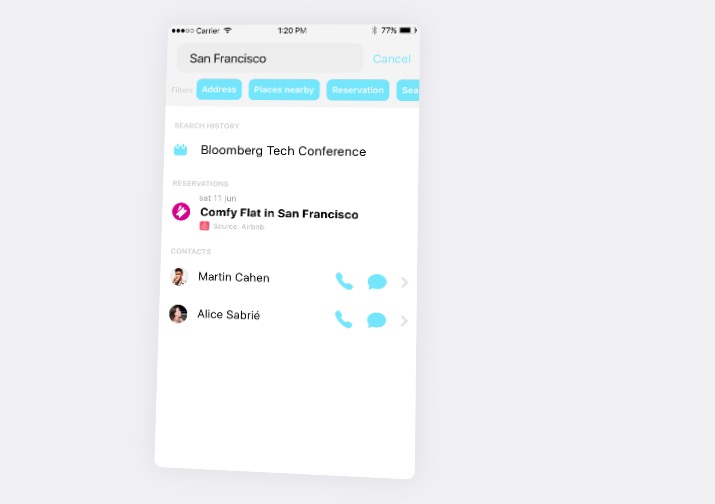


Science fiction has enrapt the world with conversational artificial intelligence. Iron Man’s Jarvis is the most notable culprit, but Her‘s Samantha and even the droids in Star Wars imagine a world where supercomputers integrate seamlessly into our everyday life. But that’s not the only way for computers to help.
Snips, a French company just launching in the United States, has a different idea about how to serve as a personal assistant. Snips connects to every relevant data stream in your phone—contacts, email, calendar, accelerometer, location data—and logs everything. The company is even working on a feature for Android to read all the text on your phone’s screen. Once it has all this information Snips is a unified place to find and act on your own data: a digital memory bank.
The app’s design is simple, and consists of two pages. The first is a tiny map of your location, hovering over a search bar. This search bar is the main function of the app, and the portal into all of your data. Type a name to find relevant appointments or events that involve that person. Type a place to find travel plans to that location, or how to get there. It’s more than just finding a restaurant or directions (although you can do that), but a pool of your personal data that you can dip into at will. The second screen, found by swiping up on the home screen, is that pool of information. It’s a grid of every data stream brought into the app, so users can control what the apps sees. It also offers up some other quantifiable information, like a graph of your usual schedule and how many countries you’ve visited.
Snips cofounder and CEO Rand Hindi is hoping that users will want to add more and more streams to get more benefit over time, and watch their page grow.
“We want you to care for it,” Hindi said. “You need to put all your data together and give that to your assistant, so that it knows everything about your life.”
Of course, this is a ripe target of information for hackers and those who would benefit from access to every piece of someone’s information, raising security and privacy concerns. To combat those potential attempts, Snips processes all information on the phone itself. No data is sent to a server, unless users opt into sending anonymized data for analytics. Since everything runs on the phone, Snips runs the risk of being thirsty for battery, but I didn’t notice too much of an extra drain while trying out the app.
The app uses artificial intelligence to analyze all the text that’s imported into the system, and creates a graph of all the information. It will recognize names from texts and match them with contacts and emails, and serve them all up when a user searches for that name.
Other virtual personal assistants like Siri and Google Now take advantage of all the data they can, but don’t integrate as deeply into each service. For instance, Google Now will automatically pull travel information from emails, but can’t be used to manually search through emails, contacts, and reservations. Siri and Google Now are also different in their approach. Siri is an assistant that you ask for help—schedule a meeting, send me a reminder, tell me the score, etc. Google Now automatically wants to serve information like the score of the game or how long it would take to get home. Snips is more passive than either—it’s just a place to find anything in your digital life, with some reminders about what you should be doing.
However, the app requires extremely curated sources of information, and is only as good as the data you put into it. I searched a friend on Snips, and in the address field from my contacts it only found his ZIP code. (A relic from syncing my phone’s contacts to Facebook.) Snips automatically used that as the number of his street address, and if I had not double-checked, would have sent me 45 minutes away from where he actually lived. Also, as I assume for most people, my work calendar has a majority of my day’s appointments. However, due to an overzealous IT department I can’t connect my email to third parties, rendering Snips completely useless for my work life.
But Snips rethinks the way we interact with personal assistants. They’re looking to add text and voice chat capabilities, but maintain that searching for your information will stay the cornerstone of the app.
Hindi says they’re also still looking for a way to monetize the app. He says things that undermine data security like advertising is out of the question, but looks at partnerships with services like Uber as potential revenue streams.
Snips is free on the iOS App Store, and the Android app is coming soon.
